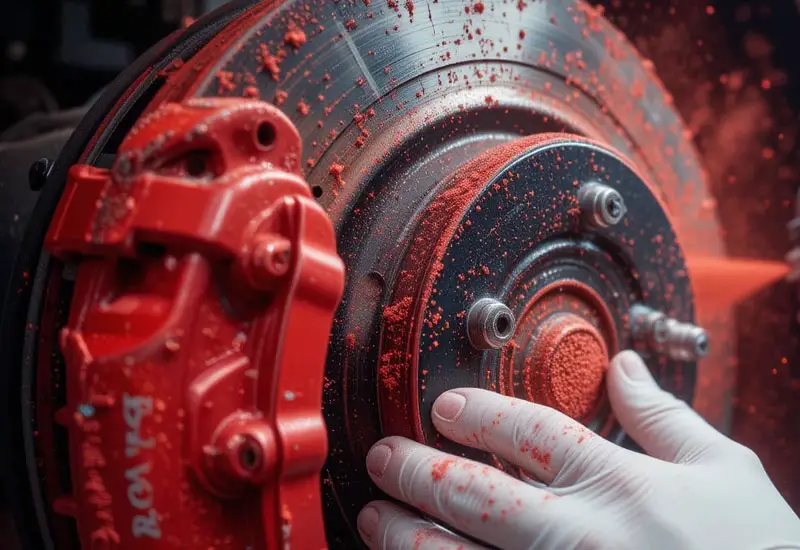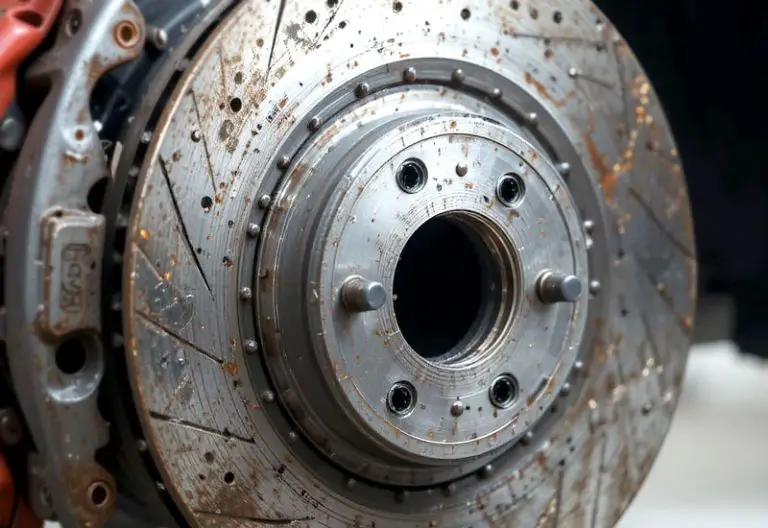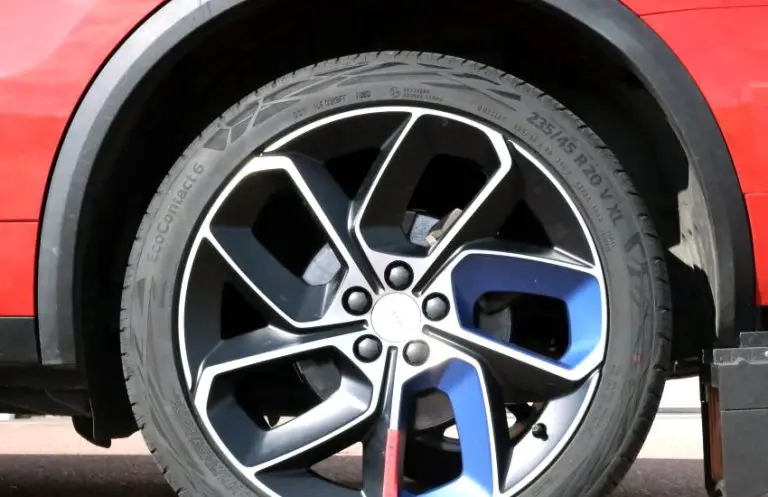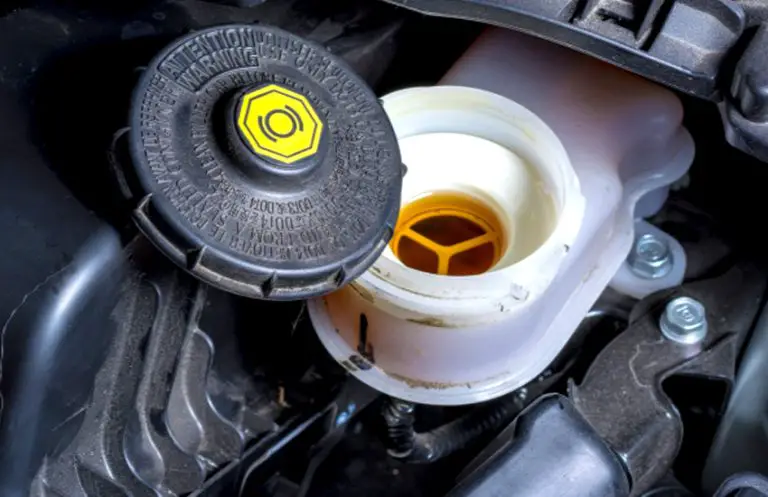Have you ever wondered if you can powder coat your brake drums to make them look sleek and stylish, or maybe even improve their durability? You’re not alone! Powder coating has become a popular choice for giving many parts of a car a fresh, shiny look. But when it comes to brake drums, there are some important factors to consider. In this guide, we’ll dive into whether or not it’s possible to powder coat brake drums, the pros and cons, and everything in between!

Understanding Powder Coating
Before we jump into the nitty-gritty details about powder coating brake drums, let’s first take a step back and understand what powder coating is. You’ve probably heard of it, and if you’ve ever seen those shiny, smooth finishes on car parts, there’s a good chance it was powder coating at work.
Powder coating is a finishing process that applies a dry powder onto a surface, which is then heated and cured to create a durable, attractive finish. It’s a popular choice in industries like automotive, because it provides a smooth, tough coating that resists chipping, scratching, fading, and even corrosion.
The reason we’re asking if it’s possible to powder coat brake drums is that not all parts of your car are ideal for this kind of treatment. After all, brake drums are subjected to extreme heat and pressure. So, let’s figure out if powder coating is a good fit!
What Are Brake Drums and Their Purpose?
The Role of Brake Drums in Your Vehicle
To understand why powder coating brake drums is a bit of a tricky subject, we first need to get familiar with brake drums. Brake drums are crucial components of a drum brake system, which is a type of braking mechanism found in some cars, especially older models or rear wheels of modern cars.
Brake drums work by using friction to stop your vehicle. When you press the brake pedal, brake shoes inside the drum press against the drum’s interior surface. This friction slows the car down and eventually stops it.
Why Do Brake Drums Matter?
It might seem like the brake drum is just another metal part of your car, but it actually plays an essential role in your vehicle’s safety. If they get too worn out or damaged, your car could take longer to stop, or worse, fail to stop altogether. So, it’s important to make sure the brake drums stay in good shape. That’s where protective coatings, like powder coating, come into the picture.
However, brake drums are constantly exposed to heat, moisture, dust, and debris. The surface has to endure extreme friction during braking, which can affect the condition of the metal. This leads us to why powder coating may seem like a good option, but might not be suitable for brake drums. Let’s dive deeper into that!
The Basics of Powder Coating Process
What Is Powder Coating?
At its core, powder coating is a dry finishing process that applies a powder made of finely ground particles onto a surface. The powder is typically made from a combination of resin, pigments, and other additives. Once the powder is applied to a surface (such as your brake drums), it’s heated in an oven to a temperature high enough to melt the powder, allowing it to flow smoothly and form a solid coating. The heat then cures the coating, making it tough and durable.
One of the key benefits of powder coating is that it’s an eco-friendly alternative to traditional liquid painting, since it doesn’t contain solvents or hazardous chemicals. Powder-coated surfaces are typically resistant to scratches, corrosion, and fading, which makes it a great option for parts that need extra protection, like wheels, frames, and even some engine components.
How Does Powder Coating Work on Brake Drums?
To powder coat brake drums, the drums are cleaned and prepped by removing any rust, dirt, and debris. Once clean, an electrostatic gun is used to apply the powder. The charged powder sticks to the surface of the drum, and the whole part is then placed in an oven to cure the coating. After curing, the result is a smooth, even, and durable finish that looks sleek and offers extra protection against wear and tear.
Seems easy enough, right? But here’s the thing: the brake drums are constantly exposed to heat from braking, and if the coating can’t withstand these high temperatures, it could deteriorate over time. That’s why it’s important to think about whether powder coating is the best option for your brake drums.
Advantages of Powder Coating Brake Drums
Durability and Protection
One of the biggest benefits of powder coating brake drums is the added layer of protection it provides. Brake drums are exposed to a lot of wear and tear, and powder coating can help protect the metal underneath. The coating is resistant to chipping, scratching, and corrosion, making it a great option for parts that experience a lot of abuse.
Powder-coated brake drums also have an enhanced ability to resist chemicals and moisture, which is important because brake components can get exposed to brake fluid, water, dirt, and other contaminants.
Aesthetic Appeal
Let’s be honest – one of the most exciting reasons for powder coating is the look! A fresh, glossy, or matte finish can completely transform the appearance of your car’s brake drums. With a wide range of colors and textures available, you can customize the look of your brake components to match the color scheme of your vehicle. Whether you’re going for a bold and flashy look or something more subtle, powder coating allows for a lot of creative expression.
Easy Maintenance
Powder-coated surfaces are easy to clean and maintain. The smooth surface makes it harder for dirt and grime to stick, so you won’t have to worry about frequent cleaning. Plus, if you keep up with regular maintenance, the coating can last for many years without showing significant wear.
Eco-Friendly Option
Another great benefit is that powder coating is environmentally friendly. It doesn’t release harmful fumes or chemicals, making it safer for both the environment and anyone handling the materials. If you’re into eco-conscious modifications, powder coating brake drums could be the way to go!
Potential Challenges and Risks of Powder Coating Brake Drums
Heat Resistance Issues
The main concern with powder coating brake drums is heat. Brake drums generate a lot of heat during braking, and that heat can exceed the limits of typical powder coating materials. If the coating is not heat-resistant enough, it could melt, warp, or discolor, which could compromise the performance of your brakes.
Brake drums need to operate at high temperatures without affecting the safety or functionality of the vehicle, so coating them with something that can’t handle these conditions could be risky.
Brake Performance Concerns
While powder coating can add durability and protection, it’s crucial to remember that the brake drum’s surface must maintain its ability to provide friction when the brake shoes press against it. If the powder coating alters the texture of the brake drum, it could impact the braking performance, making your car less safe. Too smooth of a surface could reduce the friction, while an uneven coating could create irregularities in brake function.
Difficulty in Repairing Damaged Coatings
If your brake drums get damaged or the powder coating begins to peel, it can be more difficult to repair compared to other types of finishes. Unlike a simple repaint, repairing powder-coated surfaces requires removing the entire coating and reapplying it, which can be more time-consuming and costly.
Cost Considerations
Powder coating may cost more than traditional paint or other finishes, especially if you’re having it done professionally. For something like brake drums, which are usually hidden behind the wheels, you may want to weigh the cost against the aesthetic benefits, as the extra expense might not always be justified.
Alternative Coating Methods for Brake Drums
Traditional Paint
If you’re not sure whether powder coating is the right choice for your brake drums, you could always opt for traditional automotive paint. It’s a more cost-effective option and can still provide a smooth, shiny finish, although it may not be as durable or resistant to damage as powder coating.
Ceramic Coatings
Another alternative is ceramic coatings, which offer high heat resistance and durability. Ceramic coatings are often used for brake parts because they can withstand high temperatures without degrading. They also provide additional protection against corrosion, dirt, and brake dust. Ceramic coatings are a great option if you’re worried about the heat resistance of powder coating.
High-Temperature Paint
For brake components that deal with extreme heat, high-temperature paints can be a great solution. These paints are designed to withstand the kind of heat generated by brake drums during operation, without warping or melting. While not as long-lasting as powder coating, high-temperature paints are relatively easy to apply and can still offer protection.
Factors to Consider Before Powder Coating Brake Drums
Vehicle Usage and Driving Conditions
Before deciding whether or not to powder coat your brake drums, think about how you use your vehicle. If you do a lot of heavy braking, live in a hot climate, or drive on rough, debris-filled roads, the heat and stress on your brake drums could be much higher. In such cases, you might want to stick with materials or coatings that are designed for high-performance conditions.
Brake Drum Material and Composition
The material your brake drums are made from also plays a role in determining whether powder coating will work effectively. Some metals may be more prone to heat damage than others, so it’s important to consider whether your brake drums are made of a material that can handle the additional layer of coating.
Professional vs DIY Application
While powder coating might sound like something you could do yourself, it’s generally best to leave it to professionals. Powder coating requires specialized equipment, such as an electrostatic applicator and a curing oven. DIY powder coating can be tricky, and if it’s not done properly, it could affect the quality and performance of your brake drums.
Is Powder Coating Brake Drums Worth It?
I hope this guide has helped you understand the pros and cons of powder coating your brake drums. While powder coating offers great durability, aesthetic appeal, and protection, it’s not always the best option for brake components that deal with extreme heat. Be sure to carefully consider your driving conditions and brake performance needs before making the decision. If you’re unsure, consulting a professional can help you make the right choice!
Frequently Asked Questions
Is it safe to powder coat brake drums?
Powder coating can be safe for brake drums if done properly and with the right materials. However, due to the heat generated by brake drums, it’s important to ensure the coating can withstand high temperatures without degrading.
Can powder coating impact brake performance?
Yes, if the powder coating alters the texture or surface of the brake drum, it can affect the friction needed for effective braking. It’s important to ensure that the coating doesn’t interfere with the brake system’s function.
Do I need to remove the old paint before powder coating brake drums?
Yes, it’s essential to remove any old paint, rust, or contaminants from the brake drums before applying a powder coating. This ensures that the coating adheres properly to the surface.
Is it more expensive to powder coat brake drums?
Powder coating is generally more expensive than traditional painting. It involves specialized equipment and a curing process, which can add to the overall cost.
Can I powder coat other brake parts?
Yes, you can powder coat other brake components, but it’s essential to ensure they can handle the heat generated during braking. Many car enthusiasts powder coat wheels, calipers, and even suspension parts.
Is powder coating an eco-friendly option?
Yes! Powder coating is an eco-friendly alternative to traditional painting because it doesn’t contain solvents or harmful chemicals, making it safer for both the environment and the person applying the coating.
Can I do the powder coating myself at home?
It’s not recommended to powder coat brake drums yourself, as it requires specialized equipment, like an electrostatic gun and a curing oven. For the best results, professional help is usually the way to go.
Do I need to worry about powder coating fading over time?
Powder coatings are known for their long-lasting color and finish. However, over time, exposure to extreme conditions (like heat and UV light) could cause the coating to fade or degrade. Proper care can help maintain the finish for longer.


